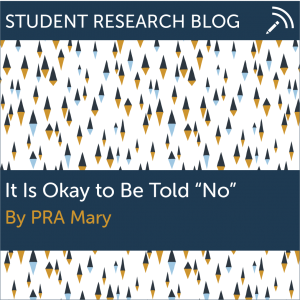By Mary Vlamis, Peer Research Ambassador
Trying to get involved in research as an undergraduate student is daunting. It is uncomfortable to enter, or in this case attempt to enter, academia as it is unlike anything you have encountered before. Fortunately, we have the tools to help you with this learning curve to make it as easy as possible. The other source of anxiety most students face is the fear of rejection. No matter how perfectly you construct your first email, or how much you research for your first conversation, there is always the lingering thoughts of, “What if they say ‘No.’” And even worse, “What does that say about me?” The short answer is that it will be okay if you are told no, and that says nothing about you.
When I was a freshman, I learned about undergraduate research experiences from some upperclassmen I really admired. Having always been a curious individual, I knew this was an opportunity that I wanted to incorporate into my undergraduate career. My experienced friends helped me construct some emails to send out to faculty whose research I found interesting. I was nervous to hit send, but I knew this was the first step in the right direction.
Some professors never emailed me back, others simply said they did not have any projects they were working on at the time, however the most important response I received that day was a rejection. I had emailed a professor in the department of economics on his research in developing countries, and he asked me to send him my CV. His response came shortly after, explaining that he only works with students who have strong statistical skills and economics coursework with a focus on quantitative analysis. When I read that email, I felt embarrassed at first. I thought I must have burned my bridge with this professor for being naive, or perhaps it was disrespectful for me to reach out instead of being asked.
Finally, I realized that his response was not a definitive “no”, it was just a temporary one. I had to have the skills for which he was looking in order to be involved with this specific kind of research. For the next few semesters, I took a lot of math classes and empirical economics classes. In the fall of my Junior year, I took his class. I was prepared for his course (thanks to his advice!) and was a top-performer. This lead to him approaching me to work with him on his new project. And, guess what? He didn’t even remember the email that I was so embarrassed about. He just knew that I was a student with a skill set he needed.
It is so important to put yourself out there, knowing that it may mean riding through the discomfort of rejection. Rejection specifically in undergraduate research often means you do not have the skills needed for a project, which is something in your control if you are serious about being involved. Rejection is something from which you can learn important information on how to do better next time.
Mary is a senior double majoring in Economics and Political Science. Click here to learn more about Mary.